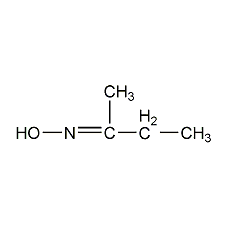
Structural formula
| Business number | 02AW |
|---|---|
| Molecular formula | C4H9NO |
| Molecular weight | 87.12 |
| label |
2-Butanone oxime, Butanone oxime, Methyl ethyl ketone oxime, Methyl ethyl ketoxime, Methyl ethyl ketone fat, A and B copper oxime, 2-Butanone oxime, MEKO, deoxidizer, Anti-skinning agent |
Numbering system
CAS number:96-29-7
MDL number:MFCD00013935
EINECS number:202-496-6
RTECS number:EL9275000
BRN number:1698241
PubChem number:24860083
Physical property data
1. Properties: colorless oily liquid.
2. Density (g/mL, 25/4?): 0.9232
3. Relative vapor density (g/mL, air=1): Undetermined
4. Melting point (ºC): -29.5
5. Boiling point (ºC, normal pressure): 152?153
6. Boiling point (ºC, 5.2kPa): Not available Determined
7. Refractive index: 1.4410
8. Flash point (ºC): 60
9. Specific rotation (º): Undetermined
p>
10. Autoignition point or ignition temperature (ºC): Undetermined
11. Vapor pressure (kPa, 25ºC): Undetermined
12. Saturated vapor pressure (kPa, 60ºC): Undetermined
13. Heat of combustion (KJ/mol): Undetermined
14. Critical temperature (ºC): Undetermined
15. Critical pressure (KPa): Undetermined
16. Log value of oil-water (octanol/water) partition coefficient: Undetermined
17. Explosion upper limit (%, V /V): 50
18. Lower explosion limit (%, V/V): 3.1
19. Solubility: miscible with ethanol and ether, soluble in 10 parts of water .
Toxicological data
1. Skin/eye irritation
Standard Draize test: rabbit, eye contact: 100?L, severity of reaction: severe.
1. Acute toxicity: Rat oral LD50: 930mg/kg; Rat inhalation LD50: >50mg/m3/4H; Rat skin contact LD: >2mg/kg; rat subcutaneous LD50: 2702mg/kg; mouse intraperitoneal LD50: 200mg/kg; rabbit dermal LD50: 200?g/kg;
2. Other multiple dose toxicity: large Rat oral TDLo: 6825mg/kg/13W-I; rat inhalation TCLo: 400ppm/6H/4W-I; rat inhalation TCLo: 1000ppm/6H/8W-I; rat subcutaneous TDLo: 14mL/kg/4W-I; TCLo by inhalation in mice: 400ppm/6H/4W-I; TCLo by inhalation in mice: 1000ppm/6H/8W-I;
4. Chronic toxicity/carcinogenicity
Rat inhaled TCLo: 75ppm/6H/26W-I;
5. Mutagenicity
Mouse lymphocyte mutation: 4600mg/L;
Ecological data
This substance is slightly hazardous to water.
Molecular structure data
1. Molar refractive index: 24.51
2. Molar volume (cm3/mol): 96.5
3. Isotonic specific volume (90.2K ): 219.1
4. Surface tension (dyne/cm): 26.5
5. Polarizability (10-24cm3): 9.71
Compute chemical data
1. Hydrophobic parameter calculation reference value (XlogP): 0.7
2. Number of hydrogen bond donors: 1
3. Number of hydrogen bond acceptors: 2
4. Number of rotatable chemical bonds: 1
5. Number of tautomers: 2
6. Topological molecular polar surface area (TPSA): 32.6
7. Number of heavy atoms: 6
8. Surface charge: 0
9. Complexity: 58.6
10. Number of isotope atoms : 0
11. Determine the number of atomic stereocenters: 0
12. Uncertain number of atomic stereocenters: 0
13. Determine the chemical bond configuration Number of centers: 1
14. Number of uncertain chemical bond stereocenters: 0
15. Number of covalent bond units: 1
Properties and stability
Avoid contact with acids and oxides.
Storage method
1. Store in a cool, ventilated warehouse. Keep away from fire and heat sources. Keep container tightly sealed. should be kept away from oxidizer, do not store together.
2. Equip with corresponding varieties and quantities of fire-fighting equipment. The storage area should be equipped with emergency spill treatment equipment and suitable containment materials.
Synthesis method
1. Obtained from the reaction of methyl ethyl ketone and hydroxylamine hydrochloride. It can also be reacted with hydroxylamine sulfate. 2. It is prepared by reacting methyl ethyl ketone, ammonium hydronitride and sulfuric acid as raw materials. The reaction formula is as follows:
Purpose
1. Mainly used as anti-skinning agent and silicone curing agent for alkyd resin coatings. This product is used as an antioxidant to prevent skin formation and is more effective than butyraldehyde oxime and cyclohexanone oxime. 2.Used as deoxidizer in boiler water system. Used as anti-skinning agent and silicone curing agent for alkyd resin coatings.
extended-reading:https://www.bdmaee.net/pc-cat-td33-catalyst-triethylenediamine/extended-reading:https://www.morpholine.org/category/morpholine/page/5393/extended-reading:https://www.newtopchem.com/archives/43916extended-reading:https://www.morpholine.org/strong-gel-catalyst-dabco-dc1-delayed-strong-gel-catalyst/extended-reading:https://www.bdmaee.net/n-dimethylcyclohexylamine-2/extended-reading:https://www.cyclohexylamine.net/main-6/extended-reading:https://www.cyclohexylamine.net/dabco-33-lsi/extended-reading:https://www.cyclohexylamine.net/ethyl-4-bromobutyrate/extended-reading:https://www.cyclohexylamine.net/dibutyl-stannane-diacetate-bis-acetoxy-dibutyl-stannane/extended-reading:https://www.bdmaee.net/cs90-catalyst-dabco-cs90-polyurethane-catalyst-cs90/

